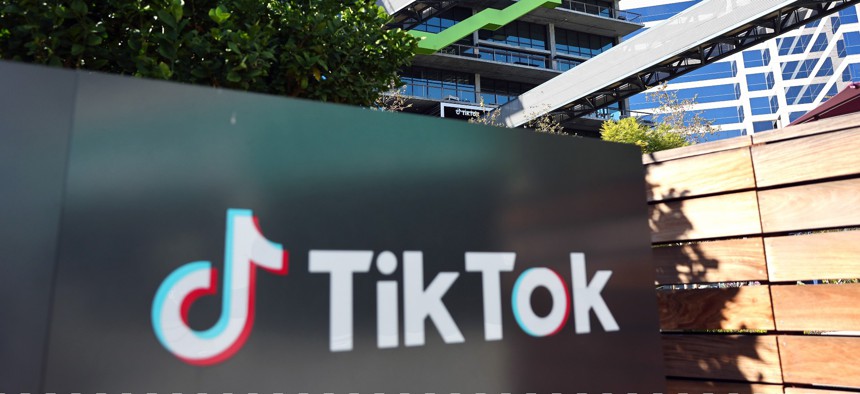Let's not cancel TikTok

TikTok's offices in Culver City, Calif. Mario Tama/Getty Images
Steve Kelman argues that First Amendment rights come ahead of vaguely articulated national security concerns when it comes to the China-owned social media app.
TikTok is the most-downloaded social media app worldwide, narrowly edging out Instagram. Given that the app’s home is in China, hardly a master of cultural attractiveness, this is quite amazing. Yet, in the context of growing hostility between the U.S. and China, efforts to punish the Chinese-owned app have been spreading like wildfire. Both FBI director Chris Wray and Sen. Marco Rubio (R-Fla.) have been on the warpath against TikTok, with Rubio introducing legislation to ban TikTok altogether in the U.S.
A ban on TikTok on federal devices was included in recently passed legislation funding the federal government for fiscal year 2023.
Wray recently stated that ” the Chinese had the ability to control the app’s recommendation algorithm, "which allows them to manipulate content, and if they want to, to use it for influence operations." Rubio argued, TikTok could "interfere in our midterm elections" and "try to influence us and divide us."
I will make few friends by saying this, but I think we need to cool it.
Let’s start off with two important facts about TikTok. One is that the most typical use for TikTok is by teenagers sharing dance videos. The second is that TikTok originates no content itself, it only disseminates content posted by others who have joined the site. (This is different from Russian disinformation efforts, where troll farms post false material online.)
It is true that TikTok has published posts by people who wanted to influence our elections, perhaps discouraging people from voting (to take one common accusation), and occasionally supporting one candidate. They also have published divisive content. But this is not TikTok trying to influence opinion or spread disinformation, it is TikTok users trying to do these things. To be sure, TikTok (and all social media apps) have algorithms that favor some kinds of content over others, but there is zero evidence (except for one example of a post about Uyghurs run a few years ago that they took down) that TikTok algorithms favor certain political points of view – such as sympathy to China -- rather than, as all social media do, favoring kinds of posts that get more and longer views.
Forbes revealed last week that TikTok has surveilled some journalists who have been critical of them. This is repulsive, but it does not relate to ways involving how China might access and misuse TikTok content, and it is something that other American tech sites, such as Facebook, not to speak of other companies outside tech (go way back to GM’s surveillance of Ralph Nader many decades ago to take an example), have also done.
There are several features of TikTok that are at least potentially worrisome. Although the vast majority of TikTok’s posts are harmless, there are certainly some posts that are embarrassing or worse – a TikTok user discussing an extramarital affair for example. TikTok in the US has access to all such posts and could in theory publish them to embarrass a user they don’t like, or even use them for blackmail. But there is no evidence that China has actually used these data in nefarious ways, such as by disseminating embarrassing posts.
Another problematic feature of TikTok is the access of the Chinese government to TikTok posts and data. TikTok execs in the U.S. vociferously deny that their U.S,-developed data leaves the US (they state it is kept on Oracle servers in San Diego). Chinese law requires that private companies provide data they have to the government on request. And internal memos leaked to BuzzFeed revealed some data has been shared with TikTok executives in China. The BuzzFeed article is not specific about how those in China with access to data use it, but in my opinion the most-plausible reason is that ByteDance in China would want to use it to help them attract users and keep them on the site longer, not for political interference.
TikTok users also provide the app with geolocation data that TikTok could potentially use to identify users who have gone to a brothel or drug den, although I don’t know whether there are databases of such places that China could match to user locations. And I know of no evidence that TikTok has actually done any of these things; the fear of exposure of such potential practices by journalists would be a deterrent to trying. My guess (though of course I can’t be sure) is that, inside the Chinese bureaucracy, the people who worry about TikTok are in a separate stovepipe from the people who seek opportunities for publishing embarrassing information or for blackmail.
A third worry is that the Chinese could take a large amount of irrelevant posts and use AI to combine them into valuable national security information. Maybe, but I’d like to see more specifics about how such efforts would generate useful national security data. And, given that the resources of either the Chinese or the U.S, government are unlimited, would spending effort having human beings exploring these rabbit holes make sense, for them (or for us)?
It is surprising how seldom two words – First Amendment – have been raised in connection with the debates on TikTok. But posts on TikTok are free speech. More than this, they are free speech that is highly valued by tens of millions of kids, probably more than much other free speech that people such as I tend to find sacred. Given this, I believe problems with TikTok should be handled by more targeted solutions – such as prohibiting the app from obtaining geospatial location data from users – rather than the blunderbuss of bans.
To appropriate a phrase from a space on the political spectrum not normally associated with defense of TikTok’s right to exist, we should avoid a TikTok cancel culture.





